Steven Spielberg: Body Snatcher–A Review of the Miniseries “Band of Brothers”
Band of Brothers, the 2001 TV miniseries, was produced by Steven Spielberg and Tom Hanks.
Episode 9 was directed by David Frankel and written by John Orloff.
Based on the 1992 book by Stephen E. Ambrose, Band of Brothers. E Company, 506th Regiment, 101st Airborne from Normandy to Hitler’s Eagle Nest, Simon and Schuster (reviewed edition by Pocket Books, 2001).
In ten episodes, Band of Brothers depicts how E (“Easy”) Company, 506th Regiment, 101st Airborne Division, trained in America and England and then fought from D-Day through to the end of the European phase of WWII. It is a technically strong and gripping production. The battle scenes are among the most realistic I have seen, though one must allow for the demands of the cinematic medium — emphasis of a few individuals and spatial compression of combat groups. I am reminded of the grim and gritty street battle sequences in Spielberg’s Saving Private Ryan. This review looks at the ninth episode, which does not depict military conflict but is itself something of a black operation in the culture wars.
As our own Edmund Connelly has repeatedly demonstrated, Jewish interests have frequently been pushed by American television and Hollywood films in various ways, often as a backdrop to stories unrelated to ethnicity, like the omnipresent upper class Anglo twit and the Black genius technical expert. The 9th episode of Band of Brothers, titled “Why We Fight”, represents an unprecedented level of ambition — to claim America’s WWII sacrifices as motivated by the desire to save Jews from Nazi persecution, to make America’s sacrifice in WWII all about the Jews, not about Americans doing their duty in a tragic internecine conflict.
The episode opens with a scene of devastation in the German town of Thalem, on April 11, 1945. There is rubble in the streets and townspeople are cleaning up. A group of relaxed G.I.s looks on from a balcony. An impromptu chamber orchestra of old men is playing a Beethoven dirge.
Then a flash-back: “One month earlier, Sturzelberg, Germany”. The war is as good as over. The Wehrmacht has given up the fight. Roosevelt’s death is announced. There are scenes of looting by officers and men; of a soldier having sex with an enthusiastic blond German girl; of drinking. The bridge over the Rhine at Remagen is announced captured.
The company is still under orders, though the men are beginning to think about life back in the States. The company moves out in convoy. A Jewish G.I. — the only Jewish soldier in the series and in the book — talks about his plans for after the war. “I’m going to find a nice Jewish girl.”
Masses of German POWs march by in orderly ranks. An officer says admiringly that even in defeat the Germans look like soldiers. But the Jewish G.I. sees nothing but objects of hate and contempt, standing up in the vehicle and screaming: “You stupid fascist pigs. . . . You ignorant, servile scum!” [Correction: actually this was Webster, a well educated non-Jew.] This displays a sophisticated vocabulary for someone who we are told in the final episode went back to driving taxis after the War. The scene does not occur in Ambrose’s book.
The company drives past a scene of summary executions of three uniformed Germans, who are kicked out of a building, made to kneel, then unceremoniously shot in the head, blood spraying. Their killers then begin to go through pockets. The killers are also uniformed but are not Americans or British. Perhaps Czech troops. The troops of Easy Company are shocked by the murders. They look down grimly, except for the Jewish G.I., who smiles.
A patrol in a forest near Landsberg in Bavaria discovers a concentration camp full of starving prisoners. (A 21-minute clip, including the concentration camp material, is available here.) The 101st did in fact liberate a camp in the area. The Jewish G.I. is the company’s translator. He translates the words of an inmate being interviewed by the commander. This is a work camp for Jews, pause, and Gypsies. [Correction: the literal quote is: “Jews, Jews, Jews, . . . Poles, Gypsies.”] The scene in Ambrose’s book does not mention Jews or Gypsies. It is described as a work camp (pp. 262–263).
German civilians in the local town deny any knowledge of the camp but they are not believed by the G.I.s. Food is requisitioned from the local town, from a bakery. We see a fat baker complaining as his entire stock is removed without explanation or payment. In Ambrose’s book there is no such character. Instead an officer finds a store of cheese and has it distributed to the camp inmates without incident (p. 262).
Whether or not there was a baker, the way he is presented is an exemplary propaganda construct of the cheapest Hollywood films. His jiggling neck and self righteous possessiveness stands for all German civilians in the town who, we are led to assume, must have known of the camp. It is implied that they remained knowingly well fed while the Jews starved. An officer threatens the baker with his pistol and accuses him of knowing about the camp. The baker’s unpleasant appearance is another example of Spielberg using hackneyed propaganda technique. It is not enough that a person do wrong. He must also wear a black hat and waxed mustachio.
The G.I.s begin to feed the camp inmates but a doctor warns of the danger of overeating following starvation. The inmates must remain in the camp under medical supervision. The Jewish G.I. is ordered to make the announcement, which he does reluctantly because he knows how much the inmates desire to be free at last. After making the announcement and pleading with the inmates he collapses in tears.
The next day all able-bodied German civilians are ordered to clean up the camp. The scenes of the cleanup are disturbing, as townspeople wade among the corpses.
The wife of a German general, seen earlier in her home facing down an American looter, is now seen pulling at bodies, humbled and distraught.
Flash forward to the episode’s start date, 11 April. Hitler’s death is reported. The company receives new orders: to occupy Berchtesgaden, Hitler’s mountain retreat.
The closing message of the episode reads: “These camps were part of the Nazi attempt to effect the ‘Final Solution’ to the ‘Jewish Question’”.
In fact these were work camps for building jet fighters. As the book states: “It was a work camp, not an extermination camp.” The film makes no mention of the POWs from Russia, Italy and other countries, German communists and homosexuals who also suffered at the hands of the Nazis. Spielberg’s film and many others like it steal the memory of the camps and the sufferings of many nations and relabel them “Jewish property”. This is an obvious lapse of scholarly standards in deference to Jewish sentiment.
The next caption reads: “Between 1942 and 1945 five million ethnic minorities and six million Jews were murdered — many of them in the camps.”
This again distinguishes Jewish suffering inside and outside the camp system. It implies that Jews were not an ethnic minority, which is incorrect. And it omits the ethnic majorities in Slavic lands who suffered inside and outside the camps. The high death toll among Polish and Russian civilians during the War is deemed unworthy of mention in Spielberg’s film. If the forced labour of Jews was an act of genocide, why not pay respects to the Russian, Ukrainian, and Polish nations? [Correction: The episode writer, John Orloff, points out that not all inmates’ uniforms feature the yellow star. This realistic detail attests to sound research. But why do the captions tell a different story?]
The episode claims the forced work camps for Jewish victimhood. Its lies and distortions must have been deliberate because the script was read by experts. This is a work of black propaganda that exploits fine acting and technical wizardry.
Who did Spielberg choose to direct and write the episode? With David Frankel as director and John Orloff as writer it has the appearance of complete ethnic vertical integration. Was nothing left to chance? The other executive producer was Tom Hanks, not a Jew. But he would have been no counterweight to Spielberg’s ethnic dedication. Hanks is a typical tame Hollywood WASP who has done nothing for his people, produced no equivalent of Schindler’s List.
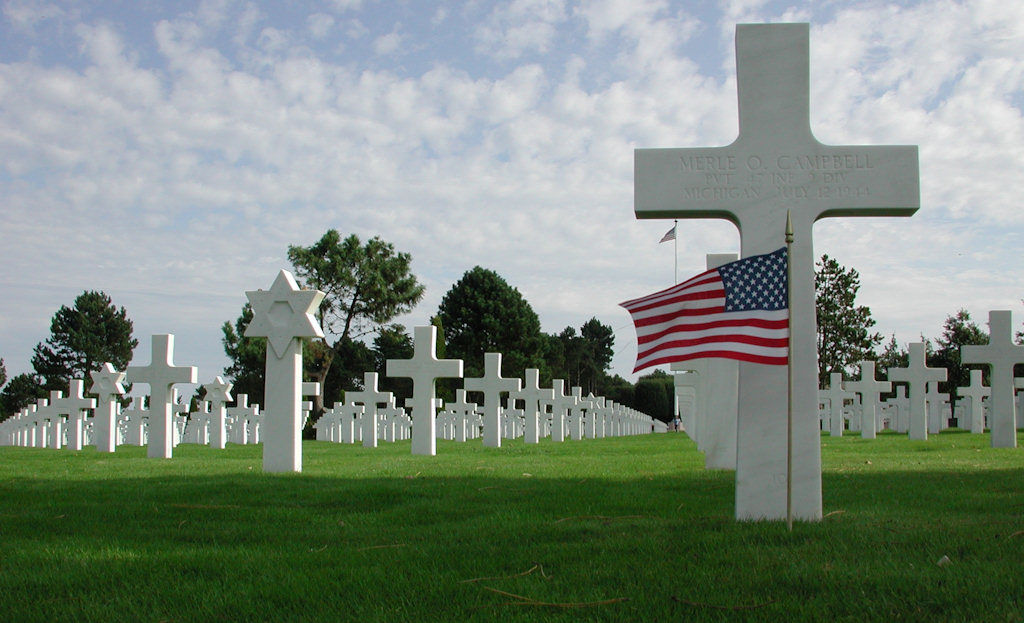
Spielberg: Film as ethnic propaganda: The cemetery scene emphasizing Jewish graves, from his Saving Private Ryan
The series received the recognition it deserved. Orloff’s depiction of the concentration camp was honoured by the American Jewish community, not at all surprising considering that it was written for them. Here he is receiving the award for Best TV film from Sam Rubin at the 2nd Annual Jewish Image Awards in Film and Television at the Four Seasons Hotel in Los Angeles, Ca. Tuesday, Sept. 24, 2002.
More on the book version
The episode’s depiction of the concentration camp differs radically from that in the book. Instead of a concentration camp full of Jews, the book describes a “Displaced Persons’ camp” at Dormagen, containing forced labourers brought from occupied Europe (p. 255). The 101st did liberate the concentration camp Kaufering IV near Landsberg on the Lech in April 1945 but this section of Ambrose’s book is not titled “Why We Fight”. The book and most of the miniseries depicted the experiences of Easy Company. Not the liberation scene. This is based on a film made by the U.S. Army at the time, and supplied to Spielberg and Hanks by the European Holocaust Memorial organization in Landsberg (see links section of the Wikipedia article).
There is documentary evidence of the mixed status and ethnic composition of workers in the Landsberg camps. In October 1944 a local administrator estimated that there were 21 camps with 5,251 inmates working for various manufacturing companies. This included eight separate Jewish camps, with one more under construction. The administrator noted that there were also prisoners of war from Poland, Russia, and France. These figures do not tally with another estimate of just one facility near Landsberg for the period 15 July to 15 August 1944, when the workforce consisted of 9,000 prisoners brought from a concentration camp — many Jewish — plus 3,000 foreign workers and 3,900 German workers. Either way there were a great many non-Jews involved.
The phrase “why we fight” does not occur in the book. Ambrose quotes Maj. Winters as saying: “Now I know why I am here” (p. 263), which was an understandable emotional reaction to the misery of the camp, not a considered philosophical statement, and not one linked exclusively to the plight of Jews. It expressed a humanitarian sentiment. It is not a warrant to rehearse the Holocaust ritual yet again and push aside the men’s true responses and priorities.
The soldiers felt that they were fighting for America, not to end suffering most Americans did not know about until after the war’s end.
Less than one page of text about the camp becomes half an episode in Spielberg’s rendering. In the book there is no mention of the Jewish Holocaust. Yet the series is presented as based on Ambrose’s book. The G.I.s did not see Jews; they saw suffering humanity. Spielberg’s biggest crime is to have rewritten the scene to represent the G.I.s as feeling and thinking like him, focused on his ethnic kin. In effect he claims the Finest Generation for the Jews.
There are also errors of omission. For example the series ignores the praiseful reaction of the G.I.s to Germans, once they began to occupy German territory. There is a story! It could have been told by someone who was sympathetic to the innocent German civilians or merely objective and looking for an interesting tale to tell. The series could have depicted American G.I.s discovering how similar the Germans were to themselves. There are dramatic possibilities in this realization. Intimate moments of self doubt, of stunned realization. Close-up encounters with vulnerable human beings; flawed but very much like Americans. One can imagine a story in which some soldiers realize they have been fighting a sort of civil war. This is not a fanciful construction — it is right there in Ambrose’s book.
The book deals with American-German relations in some details. For example the soldiers began to realize how similar the Germans were to their own loved ones — they began to realize their own ethnic kinship. On one occasion a G.I. was clearing an apartment block so that it could be requisitioned by the company. This was wartime and the G.I.s’ hearts were hardened. The procedure was to go from door to door telling the occupants they had five minutes to vacate their apartments, taking no bedclothes so that the G.I.s would be comfortable.
They came pouring out, crying, lamenting, frightened. “I knocked on this one door,” Carson recalled, “and an elderly lady answered. I looked at her and she stared at me. God, it was a picture of my own grandmother. Our eyes met and I said, ‘Bleib hier,’ or stay here.”(p. 260, emphasis added.)
This is genetic similarity at work — one genotype recognizing a similar other. The old lady did not speak. All the G.I. perceived was her face. There is more along these lines that one would never guess from Spielberg’s series, except for the Jewish G.I.’s compassion for his people in the camps
Ambrose summarizes the American soldier’s judgment of various nationalities during WWII, mostly negative.
He felt the Arabs were despicable, liars, thieves, dirty, awful, without a redeeming feature. The Italians were liars, thieves, dirty, wonderful, with many redeeming features, but never to be trusted.
The French provincials and Parisians had assorted negative traits, while the British were “brave, resourceful, quaint, reserved, dull”. The Dutch were “simply wonderful” though few American soldiers were in Holland.
Wonder of wonders, the average G.I. found that the people he liked best, identified most closely with, enjoyed being with, were the Germans. Clean, hard-working, disciplined, educated, middle-class in their tastes and lifestyles (many G.I.s noted that so far as they could tell the only people in the world who regarded a flush toilet and soft white toilet paper as a necessity were the Germans and the Americans), the Germans seemed to many American soldiers as “just like us” (pp. 248–9).
Americans admired the German civilians who, of their own volition, began picking up rubble the morning after a battle. In that regard they compared the Germans favourably to other Europeans they had encountered. How easy it would have been, how inexpensive, to have the G.I.s utter a few words of praise as they watched German civilians clearing the street at the start of Episode 9.
Ambrose suggests that some of the good impression made by the Germans was due to the comfort provided by their middle class homes. But even Webster, a convinced German hater, could not help but soften. He wrote to his parent in April 1945 that the “Germans I have seen so far have impressed me as clean, efficient, law-abiding people”. They were churchgoers. (Couldn’t Hanks persuade Spielberg to allow just one scene of Germans in church?) “In Germany everybody goes out and works”, unlike other nationalities. “They are cleaner, more progressive, and more ambitious than either the English or the French” (p. 250).
The shock of ethnic recognition experienced by G.I.s as they entered Germany has been discussed elsewhere. Ambrose quotes one author, Glenn Gray, thus: “The enemy could not have changed so quickly from a beast to a likable human being. Thus, the conclusion is nearly forced upon the G.I.s that they have been previously blinded by fear and hatred and the propaganda of their own government” (p. 250).
The only pronounced reference to ethnicity concerns the only Jewish member of Easy Company, Joseph Liebgott. He is seen early in the series objecting to an anti-Semitic outburst by a fellow private. He has no visible Jewish characteristics, unsurprising because he is played by Ross McCall, a Catholic Scotsman. Apparently Spielberg knows when genetic similarity is useful. Because the character played by McCall is so different to the real Liebgott as described in the book, I have referred to the former as “the Jewish G.I.” This is the (miniseries) character who screamed collective insults at German prisoners of war and smiled at the murder of others.
The Jewish G.I. character is given some balanced resolution in the tenth and final installment directed by Mikael Salomon. In July 1945 the division is occupying a part of Bavaria, which includes Hitler’s mountain retreat, the Eagle’s Nest. For much of that episode he is in a vengeful state of mind, occupying a black and white world where all Germans are on the dark side. He even kills a man on the hearsay that he had been a concentration camp commander and personally questioning him (well, he demands his death; another G.I. pulls the trigger). This is true to the book. We detect some softening when the Jewish G.I. translates a speech by a German officer. The officer is about to disband his company, and a watching American officer asks the Jewish G.I. to interpret. At first the translation is delivered mockingly, but the speech ends up winning the respect even of someone twisted by hate. The German officer begins by saying that it has been a long hard war. That he is proud of his men. That a spirit of comradeship has arisen from sharing the same dangers. They had become brothers. Some of the German troops weep. Later we see a friendly conversation between a German and an American soldier manning a checkpoint together, in which the German shows a human face (he recommended the Italian front over the Russian). The closing scene of the episode is in documentary format. A veteran of the 101st Airborne recites the great St. Crispin’s Day speech by Henry V in Shakespeare’s play, echoing the German officer’s words.
Other scenes relating to ethnicity include one in which half a dozen German prisoners of war are murdered in cold blood in the D-Day episode. The murderer is a handsome Anglo with Nietzschean views and homicidal demeanour, who hands around cigarettes to the unarmed Germans and gives them lights before shooting them down without provocation. The killer is not coarse or low class and he speaks standard American English without a trace of provincial or big-city accent. In the last few episodes the character is rehabilitated to become a hero. He is never punished or admonished. What is the point of this invented scene, which does not occur in the book? The closest event in the book is when a few German prisoners are shot while attempting to jump their guards (p. 77). The very different film version associates Anglo ethnicity with mindless, psychopathic aggression.
Despite a scene in which a German POW shows a human face (before being murdered as above), the Germans are once again nameless aggressors. Not much change from the usual Hollywood formula. Among the G.I.s the weak characters are all Anglos. The Italian soldiers have ethnic residues but are mainly regular guys.
Conclusion
The Finest Generation were fallible human beings who were nevertheless as noble a band of brothers as there could be. They fought for their nation’s interests. Most were patriots at a time when America was seen by most citizens as a White republic. The ninth episode of Band of Brothers is an act of identity theft, an attempt to rewrite history to misrepresent the American soldiers of WWII as having different identities and different motivations than they in fact had. The ninth episode and to some extent the whole miniseries is part of an effort to airbrush from the American people’s memory the authentic historical American nation and replace it with a lie that serves leftist ideology and Jewish interests.
How can this sort of outrage occur? Once a group is beyond criticism, let alone censure, its ambition can expand to fill the status vacuum thus created. That privilege is created by the ban on anti-Semitism so broadly defined that it includes reasoned criticism of Jewish political culture. Any attempt to criticize Spielberg or other Jews for ethnic bias would attract the anti-Semitism accusation, unleashing real penalties formal or informal. No other group is so privileged.
The replacement of White Christian historical memories with minority perspectives and sometimes by self-hate fantasies is limited by the inertial quality of those memories. The interviewees at the start of the 9th episode had mixed feelings towards Germans. Only one said that Germans were thought of as evil. One said that he could have been friends with them under different circumstances. All the veterans were relaxed. None got excited or showed hostility. None mentioned the concentration camp liberated by the 101st. None mentioned Nazis. This is congruent with the book’s cursory treatment of the work camp. While the cruel conditions in the camp were deplored, the G.I.s had seen other horrors.
Living memories also limit the chutzpah of the casting director. It is true that a Scot was cast as the Jewish G.I. However the predominance among the actors cast for the film of Northwestern European racial types and Anglo regional accents is accurate, as is the segregation of Negroes to transport duties. It will take one or two generations longer before these aspects can be falsified with impunity. It is reasonable to conclude that this is the direction film is moving when a Jewish producer can tell his White Gentile audience that their fathers fought and died not in defence of their nation but for his own ethnic interests, knowing that he is safe from effective reproach.

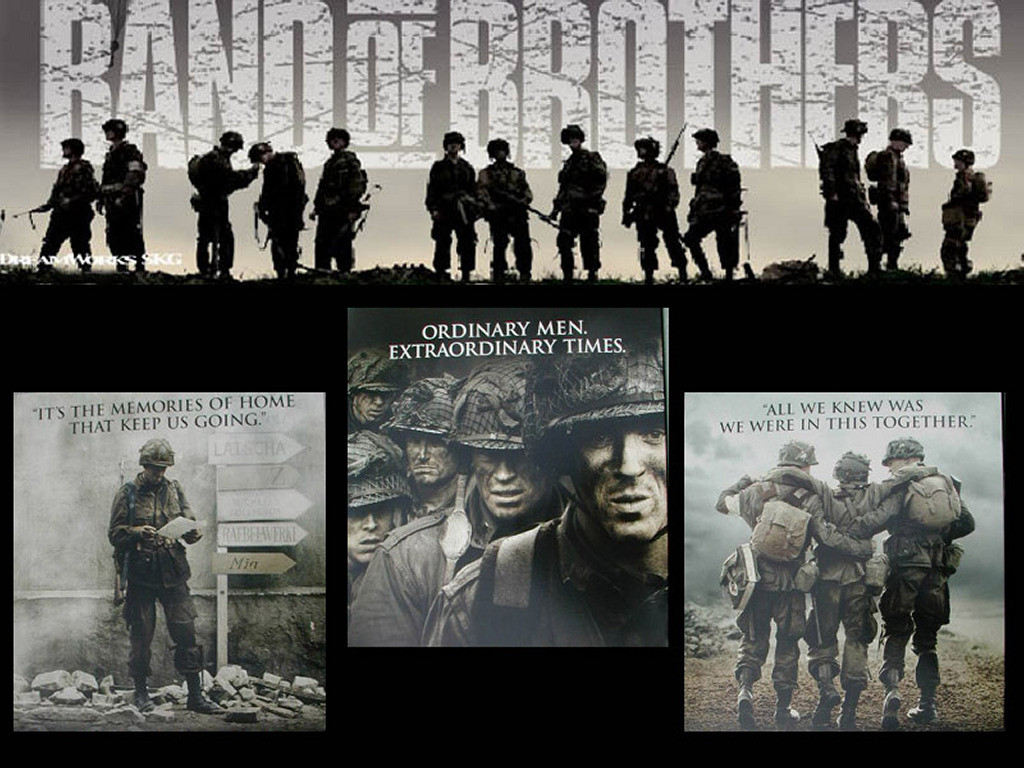
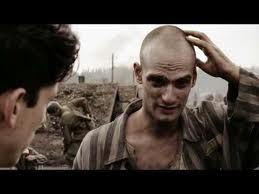
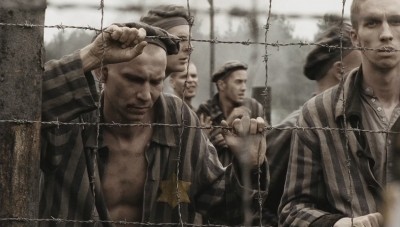
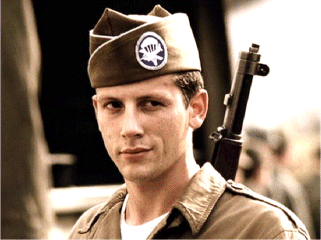




Comments are closed.